The brainchild of the Endocrine Society’s Clinical Affairs Core Committee to ensure the pipeline of future endocrinologists keeps flowing, Endocrinology Mentor Day launched in Chicago during ENDO 2023.
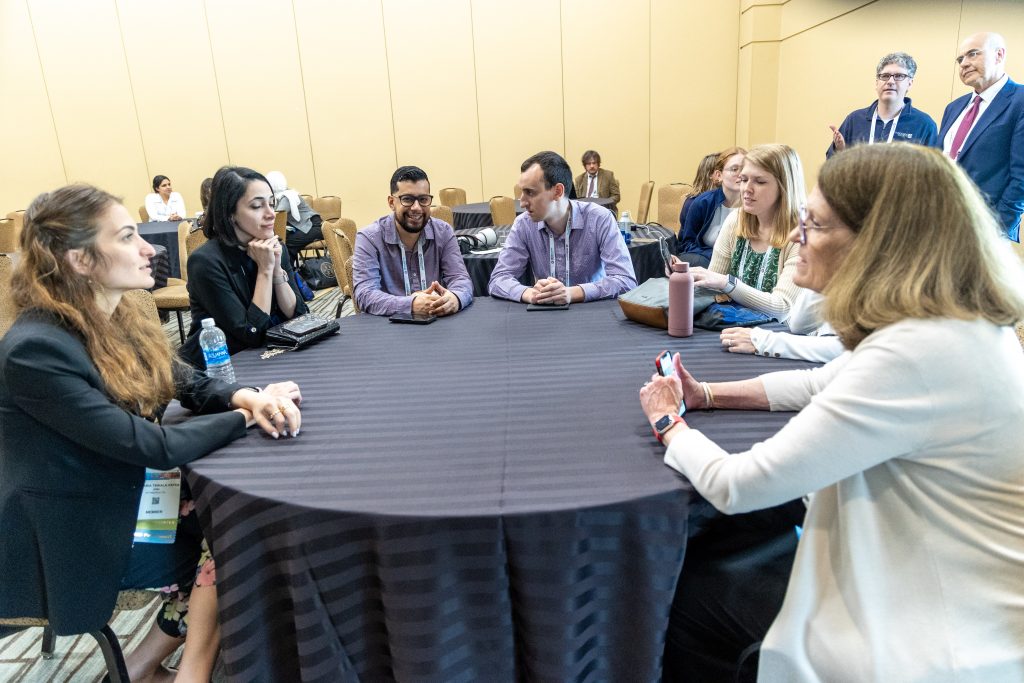
“There are a few things I like about endocrinology,” says Marah Alsayed Hasan, MD, an internal medicine resident at Lankenau Hospital in Wynnewood, Pa. “It’s a very intellectually stimulating field, and I like that it always keeps me on edge. I also like that fact that you have the opportunity to do a lot of preventative care and be able to follow patients over a long period of time and develop relationships [with them].”
It’s the inaugural Endocrinology Mentor Day at ENDO 2023 in Chicago, and Alsayed Hasan is one of several early-career and potential endocrinologists who came to the Hyatt Regency Grant Park meeting room on a bright Saturday morning, eager to get guidance and inspiration from some of the more established endocrinologists in the field, who are just as eager to pass their knowledge and expertise on to the next generation. Even before breakfast is over, other ENDO 2023 attendees are popping their heads in to catch a glimpse of the excitement, riding the buzz from other corners of Chicago’s McCormick Place.
“Endocrinology has a bright future, and we hope you are a part of it,” Dan Mihailescu, MD, an endocrinologist based in Chicago, tells the room full of trainees, residents, and medical school students. “We’re sure that by the end of the day, the only career path for you will be endocrinology.”
As Mihailescu speaks, a representative from Abbott passes out the company’s Libre 2 continuous glucose monitoring (CGM) devices for the attendees to wear for the day, a display of the new technology this next wave of endocrinologists will have access to, and a way to put them in their potential patients’ shoes. Almost immediately, phones start chirping out alerts as the devices sync and attendees begin evaluating their own levels as they finish their breakfasts.
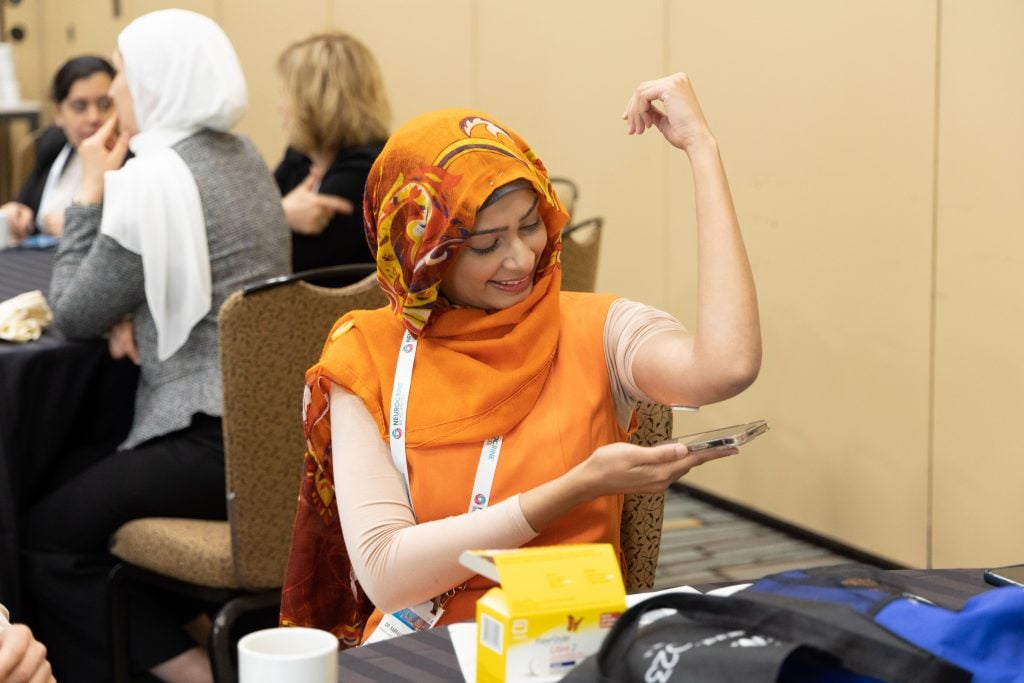
One of the day’s mentors, Ricardo Correa, MD, EdD, FACP, FAPCR, FACMQ, fellowship director, Endocrinology, Diabetes and Metabolism; director, Health Equity Center, Cleveland Clinic, Cleveland, Ohio, will later say that this hands-on approach to CGMs and talking to the mentees about what wearing these devices meant was one of the most impactful parts of the day for him. “They enjoyed learning how to wear a CGM and about its purpose,” he says.
Alsayed Hasan says that this advancement in technology is another thing she likes about endocrinology. “It means there will always be more learning opportunities for us,” she says. “As a person who’s very driven by learning, I feel like that always keep my interested and engaged in the field.”
Making Early Connections
In 2014, a paper by Vigersky et al. appeared in The Journal of Clinical Endocrinology & Metabolism that concluded, “There are insufficient adult endocrinologists to satisfy current and future demand. A number of proactive strategies need to be instituted to mitigate this gap.” A 2022 paper in JCEM by Tsai et al. reported that there are about 8,000 currently active endocrinologists in the United States, “which amounts to 41,460 individuals in the general population who may receive potential care by each endocrinologist.”
About two years ago, the Endocrine Society Clinical Affairs Core Committee (CACC) began talking about ways to increase the number of endocrinologists and found that one way to do that was to have trainees, residents, and medical students attend ENDO and devote a day to them. The committee arranged for mentors in the Society to engage with mentees and help them network so they could have a positive experience at the annual meeting and hopefully set them down the path to a career in endocrinology. And so, Endocrinology Mentor Day was born.
“I presented two posters here, but I also wanted to meet people in the field and see the research in endocrinology,” says Maria Tsikala Vafea, MD, an internal medicine resident at the University of Pittsburgh Medical Center with an interest in endocrinology. “I wanted to make connections and expand my network, which is always very important in what we do.”
According to Joshua Joseph, MD, assistant professor of medicine at the Ohio State University Wexner Medical Center in Columbus, Ohio, and chair of CACC, the committee initially thought they would just bring in future endocrinologists from the Chicago area, but attendees came from around the world. “I was sitting with someone from Italy and Ireland earlier, and the person I was walking around with was from Russia,” he says.
“I was very surprised also to see international trainees attending the mentorship program — that highlights the impact of having this type of event in our conference,” Correa says. “I really believe that this type of mentorship program should continue in every meeting. In addition, I think that with the success that we had this year, more and more trainees will come and be attracted to endocrinology, and more mentors will be available to guide these future endocrinologists.”
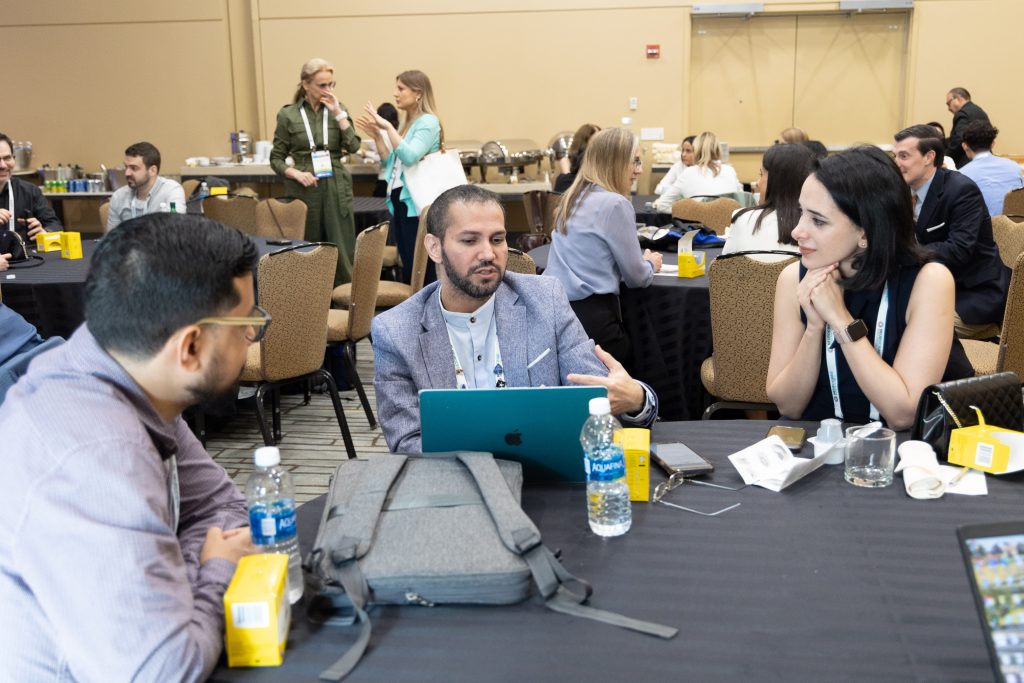
Ensuring a Wonderful Journey
With everyone’s CGM sensors affixed firmly to their arms and synced to the apps on their phones, the mentors and mentees attend the session, “Clinical Pearls from JCEM Case Reports,” in which the journal’s editor-in-chief William F. Young, Jr., MD, Tyson Family Endocrinology Clinical Professor and professor of medicine in the Mayo Clinic College of Medicine and Science at the Mayo Clinic in Rochester, Minn., and deputy editor Adina Turcu, MD, MS, associate professor of medicine at the University of Michigan in Ann Arbor, have the authors of the highest ranked articles published in JCEM Case Reports present their cases, which cover a wide span of clinical endocrinology, from a rare case of thyroglossal duct cyst cancer and pituitary macroadenoma to recurrence of primary aldosteronism after surgery.
“I really believe that this type of mentorship program should continue in every meeting. In addition, I think that with the success that we had this year, more and more trainees will come and be attracted to endocrinology, and more mentors will be available to guide these future endocrinologists.” — Ricardo Correa, MD, EdD, FACP, FAPCR, FACMQ, fellowship director, Endocrinology, Diabetes and Metabolism; director, Health Equity Center, Cleveland Clinic, Cleveland, Ohio
Then it’s on to the ENDO 2023 expo floor, where attendees view product demonstrations and speak with faculty members from around the country. Later, back in the Grant Park meeting room, Joseph says that he and his group talked to seven endocrinologists in their hour on the floor, who spoke about their institutions, their careers, and what excites them about endocrinology. That excitement seemed to be contagious, as Joseph says he could see the trainees’ eyes light up. “One of the trainees said to me, ‘I would’ve never gotten to meet all these individuals. How do you know all these people?’” he says.
“That gave me an opportunity to talk about the Endocrine Society, networking, building relationships — all these things that are so critical to having a successful career in endocrinology,” Joseph continues. “I think it demystified the conference in many ways for [this trainee]. It broke down some of those barriers to how do you engage at a big conference. And ultimately, hopefully one of the things that we can do is kind of create a family, because now they are the inaugural Endocrinology Mentor Day participants.”
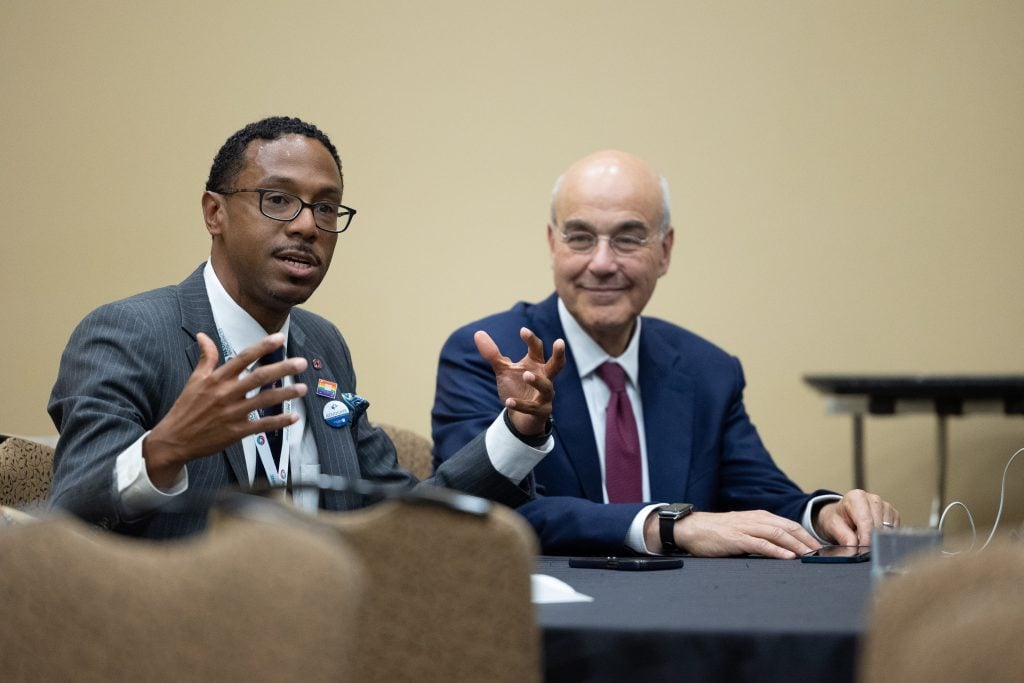
Joseph is an alum of the Society’s Future Leaders Advancing Research in Endocrinology (FLARE), a program that was initiated in 2013 and just celebrated its tenth anniversary. He says he feels like a part of a family – again, a sense of camaraderie that he hopes will extend to this first class of Endocrinology Mentor Day participants. “I think that that’s going to keep people engaged and involved and integral to the Society long term and have successful endocrine careers,” he says.
During ENDO 2023, Joseph announced that he had been promoted to associate professor of Internal Medicine with tenure at Ohio State. He credits the Society as an avenue for him to lead on a national level and to be able to serve when called upon. “I’m a big believer in servant leadership and in how we lead, how we’re serving other individuals, and Endocrinology Mentor Day is an example of that, right?” he says. “How do we serve the next generation and get them on their path and make their journey a wonderful one?”
Preparing the Next Generation
After lunch and touring some of the posters, the mentors and mentees sit in for the final plenary of ENDO 2023, “The Future of Endocrine Therapies: Personalized Organoids And Gene Editing – Is This The Real-Life or Just Fantasy?” highlighting the journey from the bench where the fundamental science begins, to the therapeutic applications currently under investigation, as well ethical implications as these therapies become more widely adopted in practice.
“I think [Endocrinology Mentor Day] demystified the conference in many ways … It broke down some of those barriers to how do you engage at a big conference. And ultimately, hopefully one of the things that we can do is kind of create a family, because now they are the inaugural Endocrinology Mentor Day participants.” — Joshua Joseph, MD, assistant professor of medicine, Ohio State University Wexner Medical Center, Columbus, Ohio
Insoo Hyun, PhD, director of Research Ethics and a faculty member of the Center for Bioethics and senior lecturer on Global Health and Social Medicine at Harvard Medical School, speaks about the ethical issues of stem cell and organoid research, and Jeffrey Millman, associate professor of Medicine and Biomedical Engineering at Washington University School of Medicine in St. Louis, discusses using stem cells to treat type 1 diabetes and just how far away that reality is. Treatments that could be just over the horizon, dovetailing with the next generation of endocrinologists.
Holding the Future
At the end of the day, in one of her final acts as president of the Endocrine Society, Ursula B. Kaiser, chief of the Division of Endocrinology, Diabetes and Hypertension, George W. Thorn, MD, Distinguished Chair in Endocrinology at Brigham and Women’s Hospital, professor of medicine at Harvard Medical School, and director of the Brigham Research Institute in Boston, Mass., addresses the attendees by detailing her own path to endocrinology, from her first encounter with a patient with acromegaly to her current focus on reproductive neuroendocrinology, as well as the myriad ways to get involved with the Endocrine Society. “When you see that you have a passion for something that’s very meaningful, so you can really know that if you suddenly feel you love something, don’t second guess yourself,” she tells her captive audience.
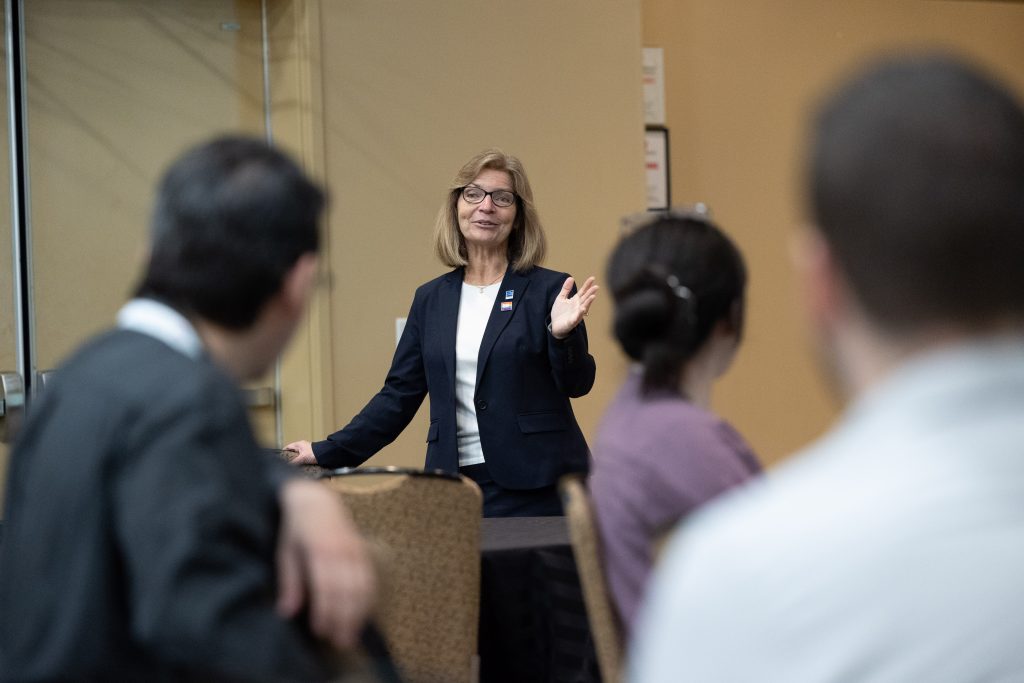
Toward the end of Kaiser’s speech, more and more CGM alarms begin to go off, eliciting laughter from the crowd. Because after all, after a day like today, they could be interpreted as celebratory bells.
By all accounts, the day was a success. Chase D. Hendrickson, MD, MPH, assistant professor of medicine at Vanderbilt University in Nashville, Tenn., says that it was great for medical students and residents to be exposed to the breadth and excitement of endocrinology that is readily on display at ENDO. “I enjoyed getting to talk to them about what they can be doing now to prepare for applying in the future for fellowship training. Being able to mentor in this unique way was quite enjoyable and one I hope will have a positive impact on the ‘pipeline’ into endocrinology,” he says.
Elif Oral, MD, professor of internal medicine at the University of Michigan in Ann Arbor and one of the day’s mentors, tells Endocrine News that great people have inspired her during her career and that she wanted to pay forward all the enthusiasm and love for the work that she gleaned from her own mentors. “If there’s anything similar that I could do, that would be worthwhile,” she says. “That’s what brought me here today. I always have trainees and students, but it’s always great to meet new people, hear new perspectives. Younger people hold the future.”
— Bagley is the senior editor of Endocrine News. In the July issue, he wrote about a novel approach to treating hypothyroidism that downplays the importance of TSH levels.

